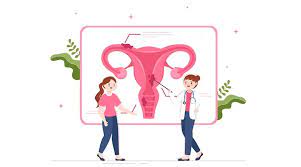Polycystic Ovary Syndrome (PCOS) is a hormonal disorder that can manifest with a variety of symptoms. It’s important to note that not all individuals with PCOS will experience the same symptoms, and the severity of symptoms can vary. The most common symptoms include:
- Irregular Menstrual Cycles: Women with PCOS often experience irregular or infrequent menstrual cycles. This can manifest as fewer than eight menstrual cycles in a year or cycles that are unpredictable in length.
- Ovulatory Dysfunction: PCOS can lead to problems with ovulation, causing irregular release of eggs from the ovaries. This can contribute to infertility.
- Excessive Androgen Levels: Elevated levels of androgens (male hormones) can lead to symptoms such as acne, oily skin, and excessive hair growth (hirsutism), particularly on the face, chest, and back.
- Polycystic Ovaries: On ultrasound, the ovaries of individuals with PCOS may show small cysts or follicles. However, the name “polycystic ovary” can be misleading, as not everyone with PCOS will have these cysts, and their presence alone does not confirm the diagnosis.
- Weight Gain and Difficulty Losing Weight: Many women with PCOS struggle with weight management. Insulin resistance, a common feature of PCOS, can make it challenging to maintain a healthy weight.
- Insulin Resistance: Insulin resistance is a condition in which the body’s cells do not respond effectively to insulin. This can lead to increased insulin levels in the blood, contributing to weight gain and potentially increasing the risk of type 2 diabetes.
- Hair Loss: Some individuals with PCOS may experience thinning of hair on the scalp, known as male-pattern baldness.
- Skin Changes: Darkening of the skin, particularly in areas such as the neck creases, groin, and underneath the breasts, can occur (acanthosis nigricans).
- Fatigue: PCOS can be associated with fatigue or feelings of low energy.
- Mood Changes: Hormonal imbalances in PCOS may contribute to mood swings, anxiety, or depression.
It’s essential to recognize that not all individuals with PCOS will experience every symptom, and some may have additional symptoms not listed here. Additionally, symptoms can change over time and may be influenced by factors such as age, lifestyle, and overall health. If you suspect you have PCOS or are experiencing related symptoms, it’s crucial to consult with a healthcare professional for proper diagnosis and management.
Elevate your women’s health journey with Dr. Arohi, your dedicated Gynecologist in Manpada. With a commitment to personalized care and a focus on overall well-being, Dr. Arohi is here to guide you through every stage of your reproductive health.

